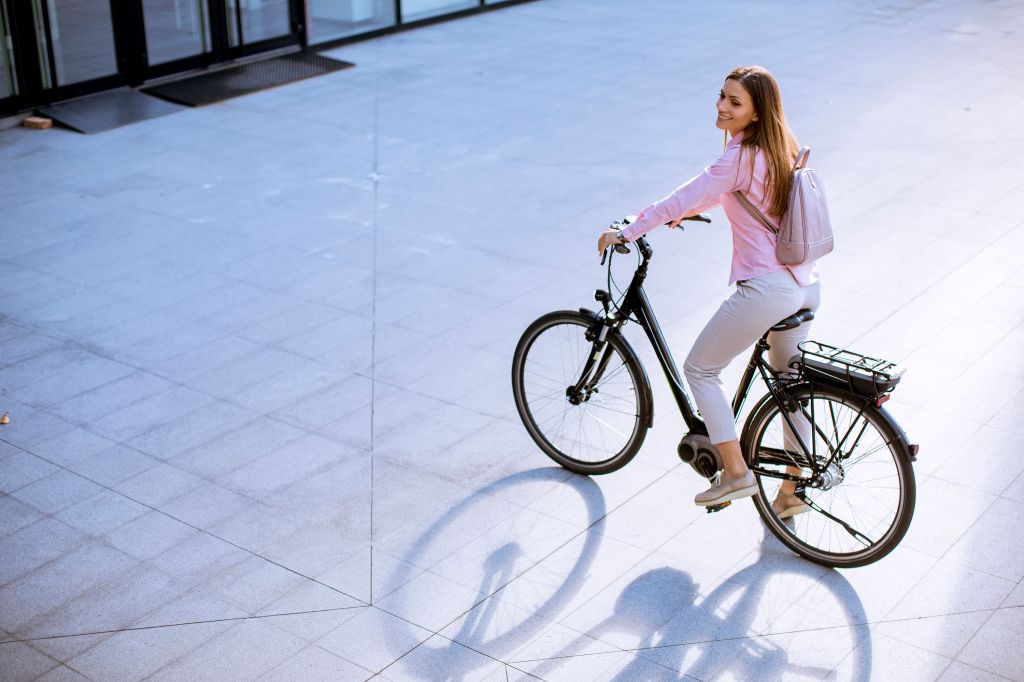eCommerce Growth in 2023
Since the health crisis, online eCommerce growth has been much higher than other channels. During Covid, double-digit growth was observed. But since returning to normal, eCommerce continues to grow faster than before the health crisis.
eCommerce growth remains strong: +9% in 2023.
Breaking down this growth by quarter, the first half of 2023 was the most dynamic, with growth still in double digits. In the second half of the year – especially the fourth quarter, the most important season for eCommerce due to Black Friday and year-end sales – growth declined.
Overall, eCommerce remains a more dynamic channel than offline channels.
Looking at the first weeks of 2024, January already shows +8% growth compared to 2023.
Average Spending and Online Purchase Frequency in 2023
Significant differences are observed between different markets.
The average online spending in 2023 ranges from €816 for Ireland to €2,120 for Germany. Purchase frequency varies from 16 orders annually for Belgium to 42 for the United Kingdom.
🇩🇪 Germany: €2,120 for 35 orders
🇬🇧 UK: €1,866 for 42 orders
🇫🇷 France: €1,756 for 27 orders
🇮🇹 Italy: €1,112 for 21 orders
🇪🇸 Spain: €907 for 20 orders
🇳🇱 Netherlands: €1,147 for 19 orders
🇧🇪 Belgium: €1,071 for 16 orders
🇦🇹 Austria: €1,582 for 25 orders
🇮🇪 Ireland: €816 for 18 orders
To better understand consumer purchasing behavior, analyzing the category mix is interesting.
🦊 Discover your average spending
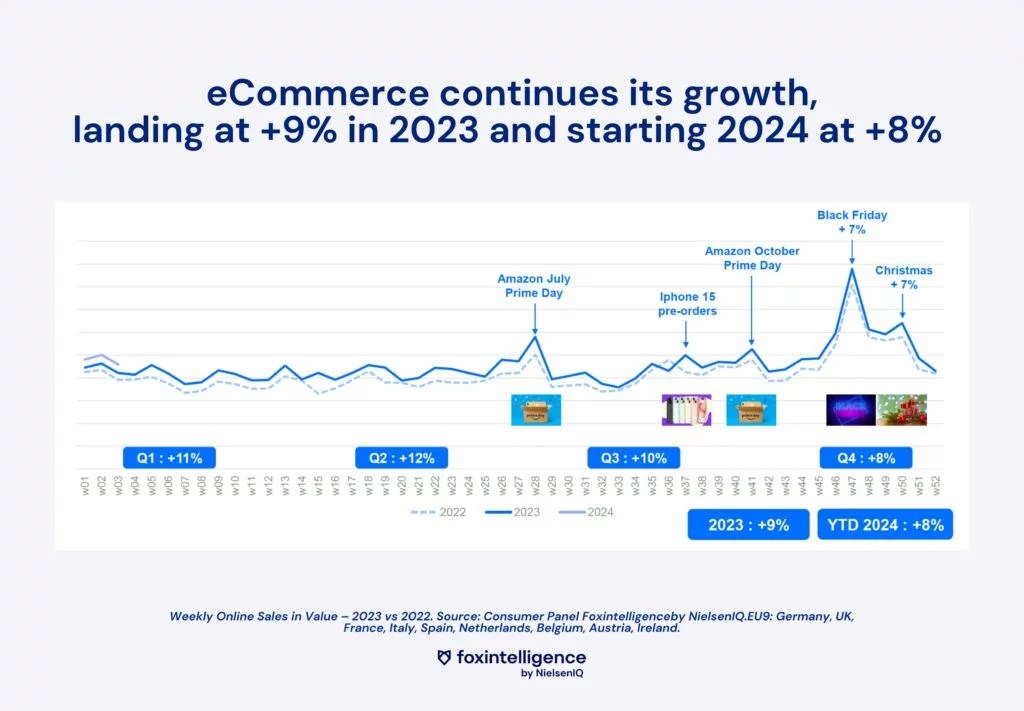
Category Mix: Which Categories Drive eCommerce?
The category mix has seen a lot of movement in recent years.
Electronics experienced rapid growth during the health crisis, then declined due to high ownership rates. The everyday consumer goods category also soared, thanks to new ways of shopping (such as Click & Collect) or the arrival of new players (quick commerce).
In all analyzed countries, rapidly rotating categories (food, beverage, household, beauty, near food) are increasing. On average, 20% of e-shoppers’ average spending is dedicated to these categories. Inflationary conditions play a role, as they have increased the share of these products in value.
It is also noted that high-tech and fashion categories – which were higher during Covid – now underperform online. Nevertheless, these categories remain present in the mix, thanks to higher article prices than everyday consumer goods.
🌍 Analyzing by country reveals a very different landscape.
In France, the UK, and the Netherlands, the share of food, beverages, and household maintenance is significantly higher than in other countries. In Germany, for example, the share of food and beverage does not exceed 5% of the overall mix.
For retailers and brands, it is essential to understand the distribution composition in each country to adapt their strategy accordingly.
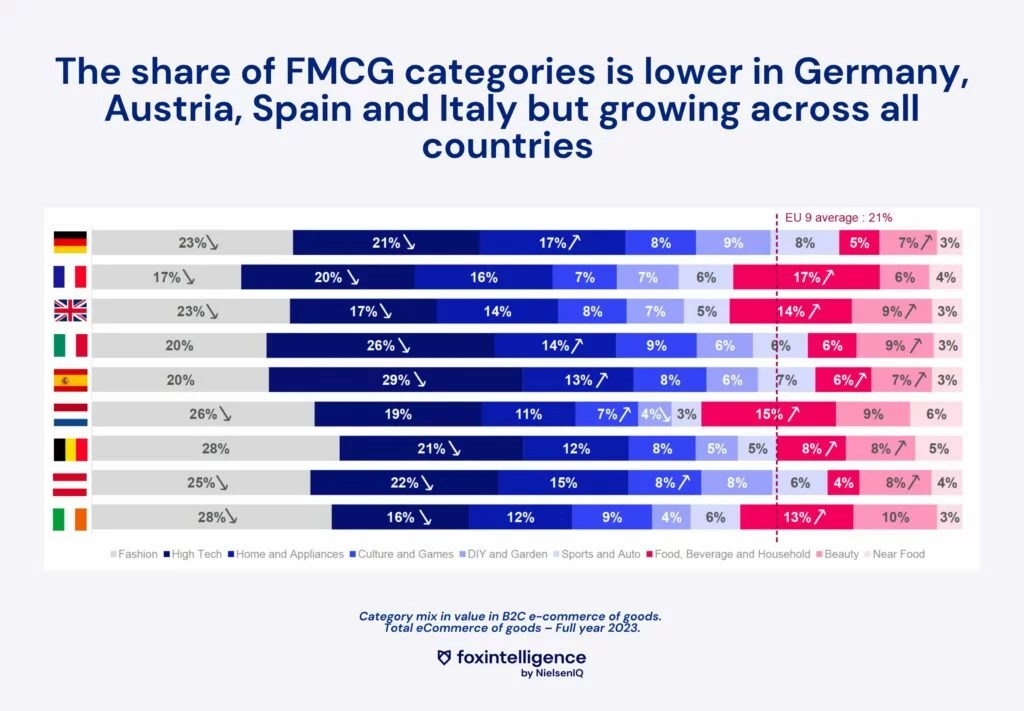
Top-performing eCommerce Players in 2023
Most Valuable Brands
🍏📦 Not surprisingly, Apple and Amazon are among the top 5 players who performed best in eCommerce in 2023.
Looking at individual brands, Apple dominates – although not being number 1 in all markets. It is also noted that Apple underperforms compared to 2022: the brand’s relative market share is decreasing. Samsung ranks first or second in all markets except Ireland, where Shein is in the top spot. In 2023, the brand opened its headquarters in Dublin, presumably increasing its likability among the Irish.
If we look at the category perspective, electronics and fashion lead the way. Furthermore, fashion does not experience as high growth as some other categories.
Nike is present on the podium, but the brand is growing less rapidly than some of its competitors. Overall, the brand’s market shares are stable or declining in all countries.
In fast fashion, Zara and Shein are quite strong players.
Local specificities are also noticed:
- In Ireland, Dunnes – Dunnes stores’ private brand – is in the top 5.
- Tesco is in the top 5 in the UK.
- In France, Leclerc’s Marque Repère is seen in several categories – one of the most purchased brands in value.
Most Valuable Retailers
Now that we have seen the most valuable brands – let’s look at which platforms, sites, and apps consumers are buying these brands from.
Amazon leads in all markets except one: the Netherlands. Bol is in the lead, with Amazon only in 4th position.
Vinted ranks 3rd in France and 4th in Spain – confirming the significant trend of second-hand sales.
🦊 Discover the top-selling brands in value in your market
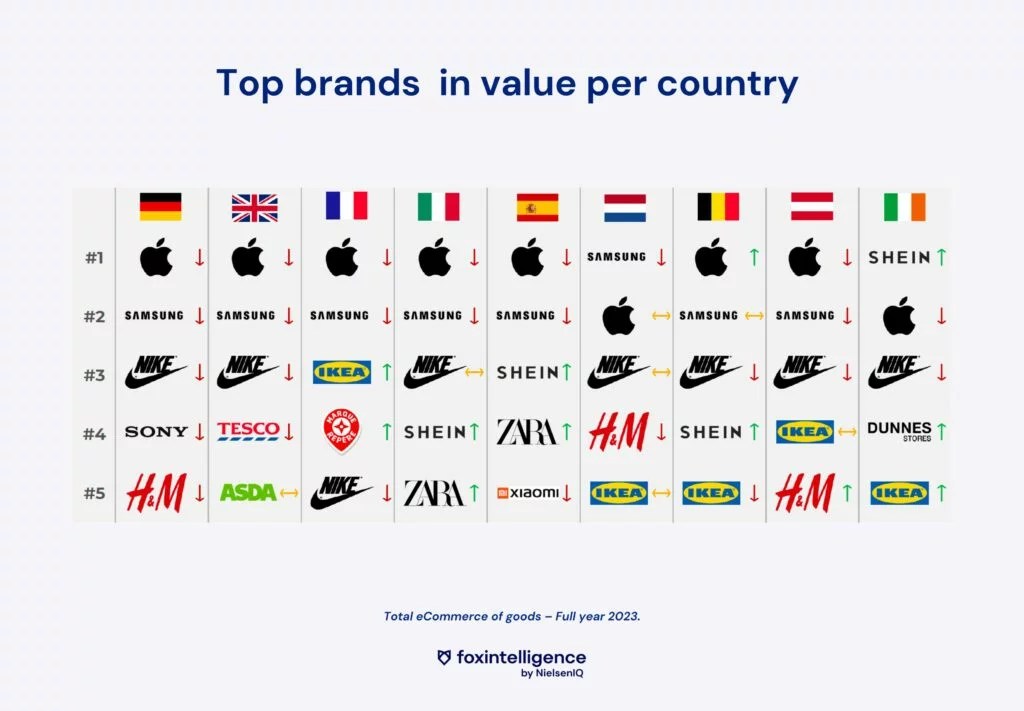
The Weight of Marketplace in eCommerce
Marketplace Model Increased by 3 Points in 2023
For retailers, marketplaces are an excellent way to expand their assortment in terms of categories – they have the opportunity to open new categories they were not present in and offer brands or products without managing the stocks. This represents a huge opportunity in terms of SEO since the more comprehensive a retailer’s offer, the more visible it will be on Google.
This opportunity comes with a challenge: dealing with internal competition between marketplace sales and the retailer’s retail sales. For retailers and brands, finding the right balance is essential.
In the 9 Western European countries analyzed, marketplace sales accounted for 36% of online purchases in value in 2023.
🇫🇷 Taking France as an example, where the food category is strong, the marketplace model is less mature than in other countries. This may partly explain why the share of marketplace sales in France is lower than some European neighbors.
But the trend is present, and the 3-point increase is significant: marketplace sales are increasing more rapidly than traditional online sales.
Rise of Fulfillment
Fulfillment drives sales on marketplaces.
In eCommerce, fulfillment refers to all steps and measures taken by the seller following an order. Namely: preparation, packaging, delivery, order tracking, return management, customer service. Optimizing the fulfillment strategy allows maximizing the logistics of an eCommerce site to the fullest.
Sellers have two options: either they perform these operations themselves, or they can use a fulfillment specialist.
Amazon launched FBA, Fulfillment by Amazon. On the dedicated site, one can read “You sell, we ship”. Brands can thus rely on Amazon for the preparation, packaging, and shipment of their orders. They can store their products in Amazon distribution centers and take advantage of the platform’s distribution network.
It is observed that the FBA service dominates most countries and experiences faster growth than some other models observed.
Not to forget TikTok: in the UK, TikTok launched its marketplace and order processing service in August 2023. Looking at the figures until December, order processing already accounts for 4% of online purchases in value on TikTok Shop in the UK.
Order processing has become a key trend that is expected to continue to grow in 2024.
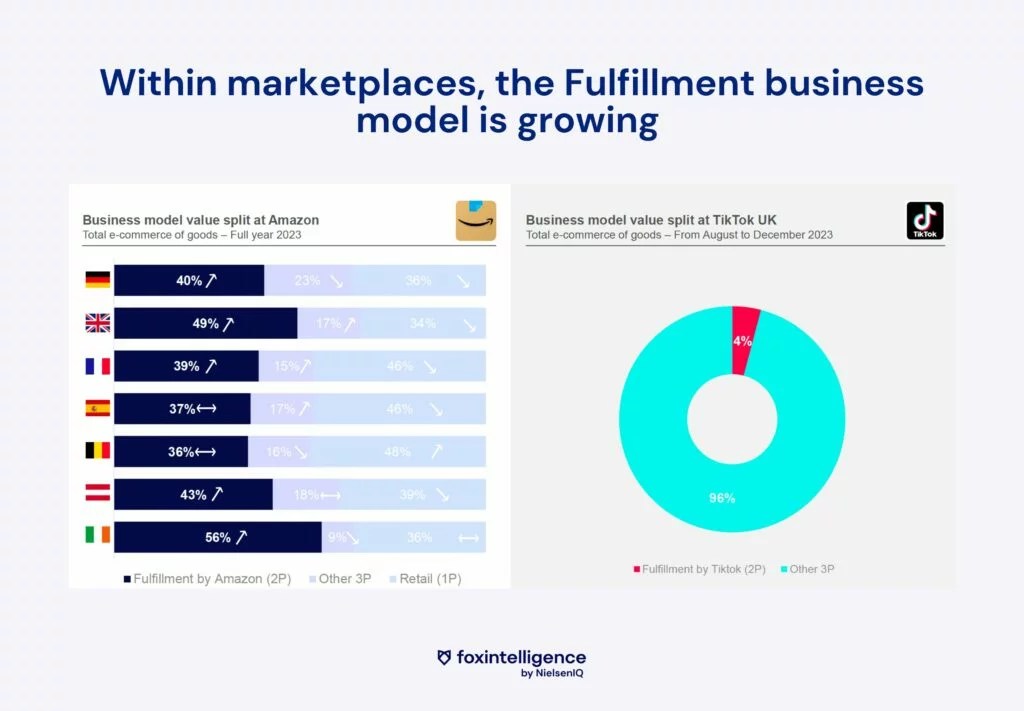
Chinese Platforms
In 2023, Chinese platforms intensified their presence in the market. Last year was notably marked by the arrival of Temu.
In terms of order volume, the share of Temu, Shein, AliExpress, and Miravia in total eCommerce is phenomenal. In absolute value, especially in Spain, it is seen that these low-priced platforms represent a significant part of eCommerce. Sales in value are obviously not as high since the average price is much lower on these platforms. Nevertheless, the figures are growing faster than the average.
Looking at the performance of these players one by one, Temu weighs heavier than AliExpress or Shein in Germany, Italy, and the UK – even though it is the latest entrant in the market. The platform has experienced impressive growth in recent months. It is noted that the average order value is slightly higher than that of the competition: this can be explained by the fact that there is a minimum amount to benefit from free delivery.
Shein, originally an ultra-fast fashion platform, has not only launched a marketplace but also expanded its assortment to include other categories besides fashion.
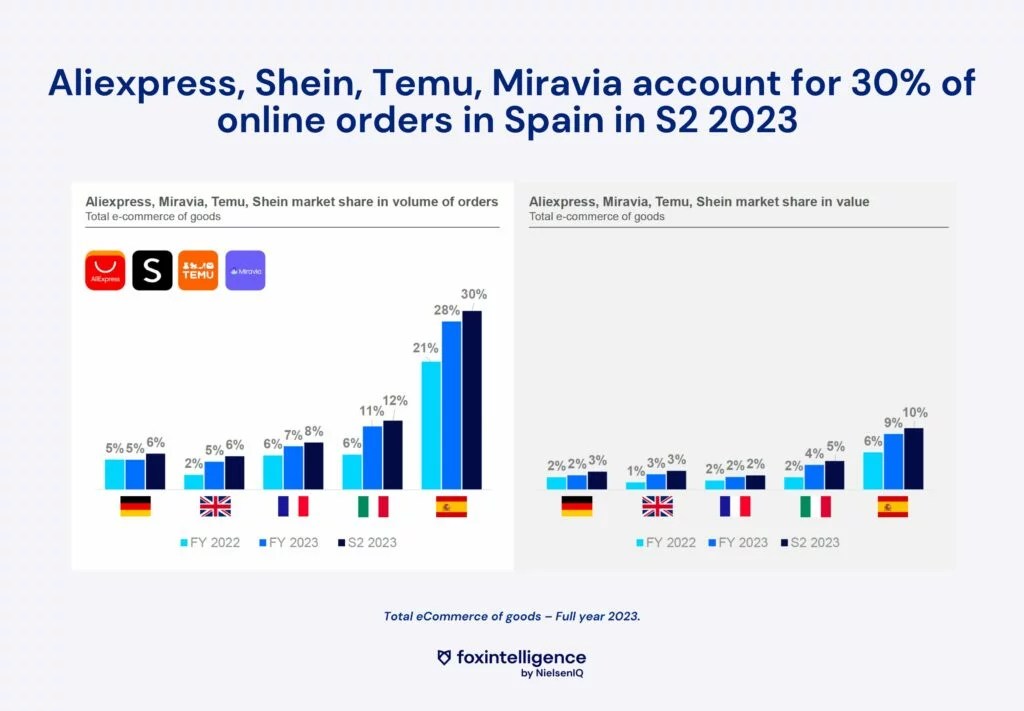
Social Commerce
Recently, TikTok has become an eCommerce platform. It leverages its popularity and consumer knowledge to sell more and more products.
In 2023, TikTok Shop accounted for over 1% of online purchases in value in the UK. Looking at the category breakdown and the evolution between 2022 and 2023, beauty and fashion are, of course, the big winners. But those categories with the fastest growth on the app are food, beverages, and household products. Even on an entertainment platform, these categories outperform compared to others.
Understanding the profile of buyers on TikTok Shop is also important. Women from Generation Z are overrepresented. Buyers on TikTok shop are valuable because their online spending is higher than average. Not because their average basket is larger, but because they buy more regularly. It was previously seen that, across all categories, e-shoppers in the UK make 42 online orders per year. For TikTok buyers, it’s 57 orders.
Key takeaways
- eCommerce remains the most dynamic channel in terms of category mix
- Global champions like Apple and Amazon are being challenged by local players
- The marketplace model continues to outperform, fueled by fulfillment and its rapid growth
- Chinese eCommerce platforms are redefining eCommerce rules
- TikTok Shop is aggressively expanding – not only in fashion and beauty categories


